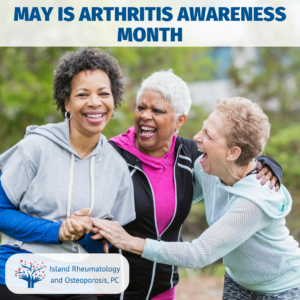May is Arthritis Awareness Month
 May is Arthritis Awareness Month, a time to spotlight rheumatoid arthritis (RA)-a chronic autoimmune disease that affects over 1.3 million Americans. At Island Rheumatology and Osteoporosis PC, we’re committed to raising awareness, supporting patients, and sharing the latest information on RA’s symptoms, treatments, and flare-up management.
May is Arthritis Awareness Month, a time to spotlight rheumatoid arthritis (RA)-a chronic autoimmune disease that affects over 1.3 million Americans. At Island Rheumatology and Osteoporosis PC, we’re committed to raising awareness, supporting patients, and sharing the latest information on RA’s symptoms, treatments, and flare-up management.
Understanding Rheumatoid Arthritis: Symptoms
Rheumatoid arthritis primarily targets the joints, often starting in the small joints of the hands and feet. Key symptoms include:
-
Persistent joint pain, swelling, and stiffness, especially in the morning or after inactivity.
-
Warmth and tenderness in affected joints.
-
Symmetrical symptoms-meaning the same joints on both sides of the body are often affected.
-
Fatigue, low-grade fever, weight loss, and general malaise.
-
In some cases, RA can cause inflammation in other organs, leading to dry eyes, chest pain, or skin nodules.
Symptoms can develop gradually or appear suddenly, and they often fluctuate, with periods of increased disease activity known as flares.
Treatment Options for RA
While there is no cure for RA, advances in treatment have greatly improved quality of life for many patients. Common treatment strategies include:
-
Medications:
-
Nonsteroidal anti-inflammatory drugs (NSAIDs) and corticosteroids to reduce pain and inflammation.
-
Disease-modifying antirheumatic drugs (DMARDs), such as methotrexate, hydroxychloroquine, sulfasalazine, and leflunomide, which slow disease progression.
-
Biologic agents (e.g., TNF inhibitors like etanercept, adalimumab), JAK inhibitors, and other targeted therapies for moderate to severe cases.
-
-
Physical and Occupational Therapy: To maintain joint flexibility and function.
-
Lifestyle Adjustments: Regular exercise, healthy diet, and stress reduction can help manage symptoms.
-
Surgery: In advanced cases, joint replacement or repair may be necessary.
Early and aggressive treatment is key to minimizing joint damage and maintaining quality of life.
Managing Flare-Ups
RA flares can be unpredictable and vary in intensity and duration. Signs of a flare include increased joint pain, stiffness, fatigue, and mood changes. To manage flares:
-
Medications: Short courses of corticosteroids can quickly reduce inflammation during flares, while regular use of DMARDs and biologics may help prevent future episodes.
-
Rest: Allow your body time to recover-don’t hesitate to scale back activities during a flare.
-
Home Remedies: Gentle exercise, a nutrient-rich anti-inflammatory diet, stress management, and techniques like meditation or acupuncture may provide relief.
-
Professional Support: Regular check-ins with your rheumatologist and, if needed, physical therapy can help you navigate flares and maintain mobility.
Raising Awareness and Support
Arthritis Awareness Month is an opportunity to educate, share experiences, and support those living with RA. Wearing a gold-trimmed purple ribbon, sharing personal stories, and joining advocacy efforts can help increase understanding and drive research for better treatments.
If you or a loved one is experiencing symptoms of RA, early diagnosis and treatment are crucial. Contact Island Rheumatology and Osteoporosis PC to schedule a consultation or learn more about managing rheumatoid arthritis.

